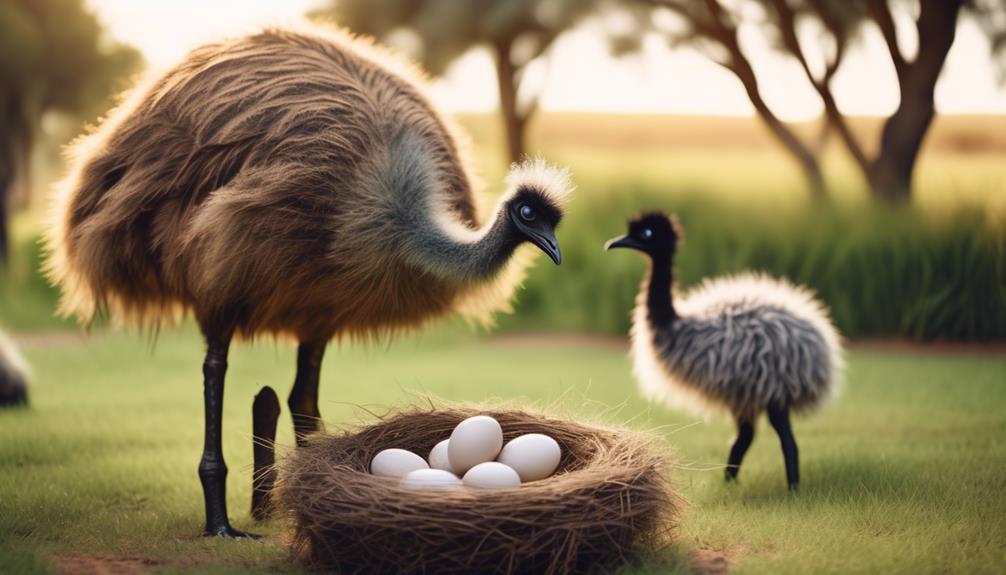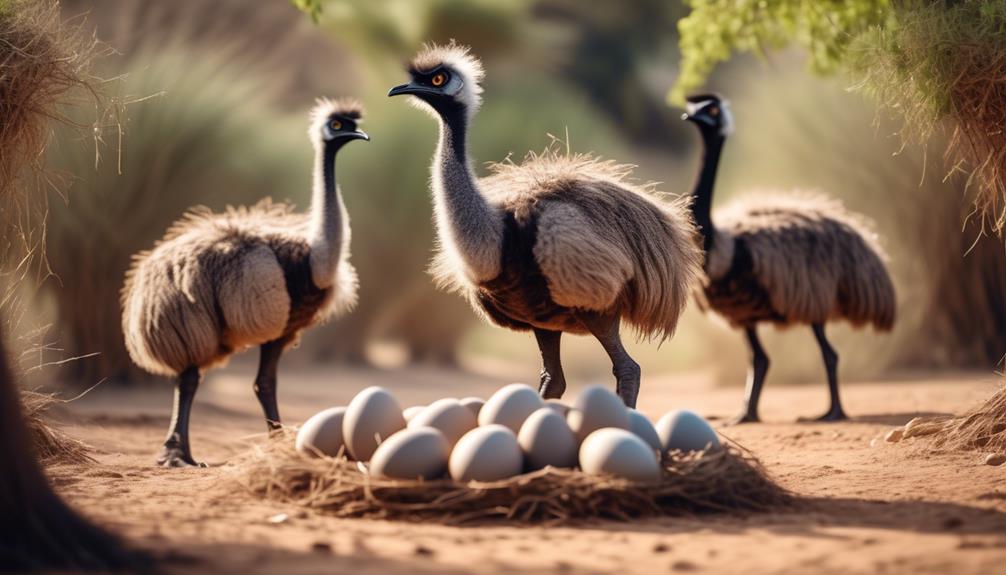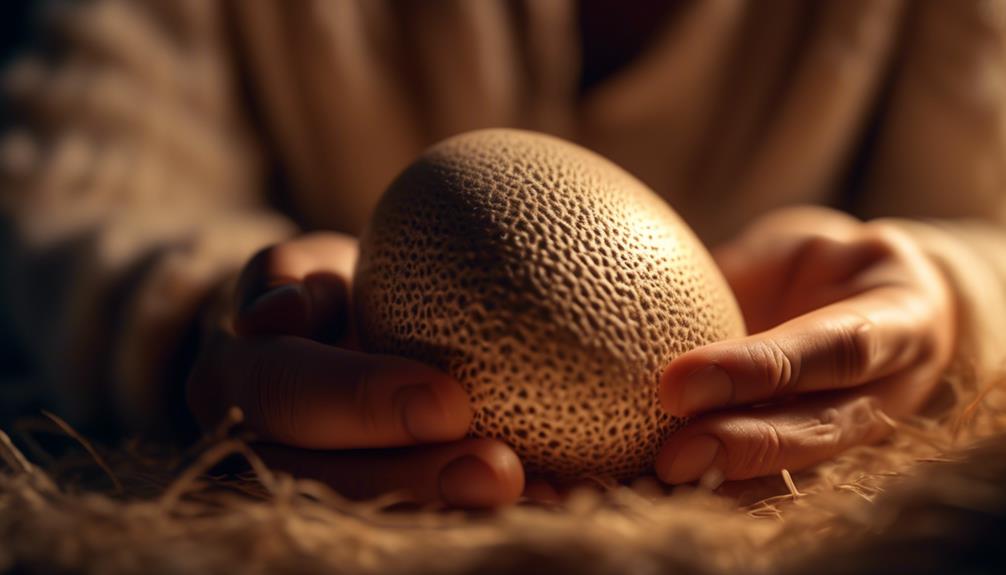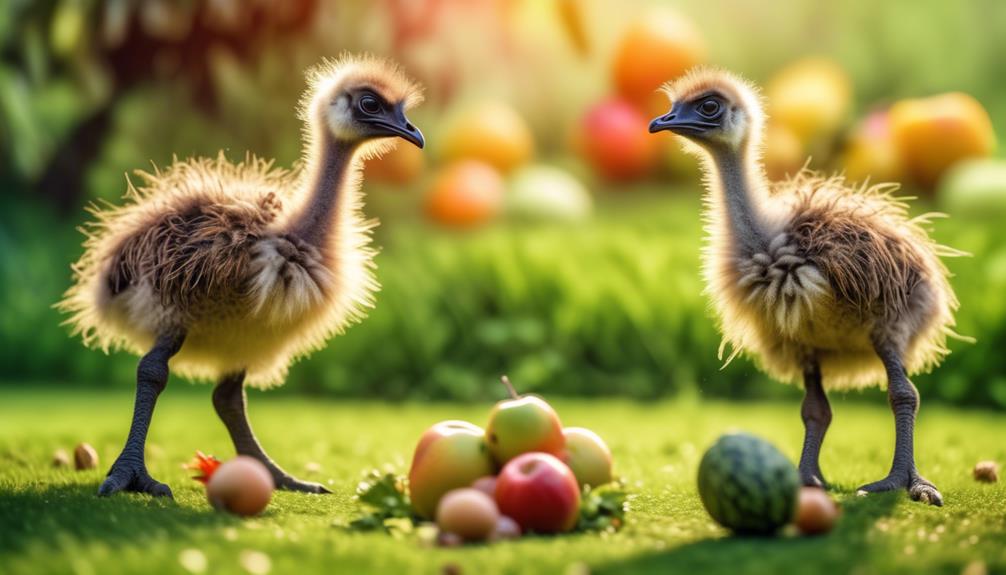
Are you interested in learning about breeding emus?
Did you know that emus are the second largest living birds in the world, reaching heights of up to six feet?
Now, imagine being able to breed and raise these fascinating creatures on your own.
In this comprehensive guide, we will walk you through the step-by-step process of breeding emus, from selecting the right breeding pair to monitoring the health and growth of the chicks.
Whether you're a beginner or have some experience with poultry farming, this guide will equip you with the knowledge and skills you need to successfully embark on this unique and rewarding journey.
So, let's dive in and discover the world of emu breeding together.
Key Takeaways
- Select emus with desirable genetic traits and good temperament for breeding.
- Create a suitable breeding environment with sturdy nests, cleanliness, and a calm atmosphere.
- Understand the emu breeding cycle, including the timing, behavior changes, and environmental factors.
- Collect and incubate emu eggs carefully, monitoring temperature and humidity throughout the process.
Selecting the Right Emu Breeding Pair
When selecting the right emu breeding pair, it's essential to carefully consider their genetic traits, health history, and temperament.
Emu breeding techniques are crucial in ensuring successful reproduction, but they come with their own set of challenges.
To begin, examine the genetic traits of the potential pair. Look for emus that exhibit desirable traits such as good size, strong legs, and healthy feathers. Avoid breeding individuals with genetic abnormalities or known health issues, as these can be passed on to their offspring.
Next, evaluate the health history of the emus. Ensure that both birds have been properly vaccinated and have a clean bill of health.
Additionally, consider their temperament. Emus with good temperaments are easier to handle and are more likely to produce offspring with similar traits.
Remember, breeding emus can be a complex process, and it's important to approach it with knowledge and precision.
Creating a Suitable Breeding Environment
To create an optimal breeding environment for emus, it's crucial to provide them with a spacious and well-maintained enclosure. Here are three key factors to consider when setting up the perfect breeding environment for your emus:
- Building emu nesting structures: Emus need a safe and comfortable place to lay their eggs. Constructing sturdy nesting structures won't only protect the eggs but also provide a sense of security for the breeding pair. Design the nests with a slight slope to prevent waterlogging and ensure proper drainage. Place soft materials like straw or hay inside the nests to make them cozy and inviting. Emus are known to be meticulous nest builders, so make sure to provide them with enough materials to construct their nests.
- Preventing common breeding challenges: Breeding emus can come with its fair share of challenges. To avoid potential issues, it's essential to maintain a clean and hygienic environment. Regularly clean the enclosure, removing any waste or debris that may harbor bacteria or parasites. Additionally, ensure that the enclosure is secure and predator-proof to protect the breeding pair and their eggs.
- Creating a stress-free atmosphere: Emus are sensitive creatures, and stress can hinder their breeding success. Provide a calm and quiet environment for the emus, away from loud noises and disturbances. Avoid overcrowding the enclosure, as this can lead to territorial disputes and increased stress levels. Regularly monitor the emus' behavior and health to promptly address any signs of stress or illness.
Understanding the Emu Breeding Cycle

Understanding the Emu Breeding Cycle is essential for successful breeding and reproduction. Emus have a unique reproductive system, and being familiar with their breeding patterns is crucial for optimal breeding outcomes.
Emus typically reach sexual maturity between the ages of 2 and 3 years. The breeding season for emus usually begins in late autumn or early spring, depending on the region. During this time, male emus become more aggressive and vocal, displaying their feathers and making booming sounds to attract females.
Emu breeding techniques involve ensuring a suitable breeding environment, which includes providing ample space for the birds to mate and nest comfortably. Factors affecting emu breeding success include diet, genetics, and environmental conditions.
Emus require a balanced diet rich in protein, vitamins, and minerals to maintain optimal reproductive health. Genetics also play a vital role in breeding success, as healthy and genetically diverse emus are more likely to produce offspring with desirable traits.
Environmental factors such as temperature and humidity can impact breeding success. Emus prefer cooler temperatures for breeding, and extreme heat can negatively affect their reproductive performance. Adequate shelter and ventilation should be provided during hot weather to ensure the birds remain comfortable.
Understanding the Emu Breeding Cycle and implementing proper breeding techniques, while considering the factors that affect breeding success, will greatly increase the likelihood of successful breeding and reproduction. By following these guidelines, you can increase your chances of successfully breeding emus and produce healthy offspring.
Collecting and Incubating Emu Eggs
To successfully collect and incubate emu eggs, it's important to follow proper procedures and guidelines. Here are some key techniques and conditions for optimal egg collection and incubation:
- Gentle Egg Collection: Handle emu eggs with utmost care to prevent damage. Emus may be protective of their nests, so approach with caution. Wear gloves and gently lift the eggs, ensuring they aren't rotated or shaken. Place them in a clean and sterile container with a soft nesting material for safe transport.
- Proper Storage: Emu eggs should be stored in a cool and dry place, at a temperature of around 50 to 60 degrees Fahrenheit. Avoid storing them in direct sunlight or extreme temperatures, as this can negatively affect embryo development. Turn the eggs gently once or twice a day to prevent the yolk from sticking to the shell.
- Optimal Incubation Conditions: Emu eggs require specific incubation conditions for successful hatching. Set up an incubator with a temperature of 97 to 98 degrees Fahrenheit and a humidity level of 25 to 40 percent. Use an automatic egg turner to rotate the eggs regularly, simulating the natural incubation process. Monitor the temperature and humidity levels closely to ensure optimal conditions throughout the incubation period.
Caring for Emu Eggs During Incubation

During the incubation period, it is crucial to provide proper care and attention to emu eggs to maximize the chances of successful hatching. Emu egg incubation typically lasts for around 50-54 days, and during this time, you need to ensure that the eggs are kept at the right temperature and are turned regularly.
Proper temperature control is essential for the development of emu embryos. The ideal temperature for incubating emu eggs is around 97.5 degrees Fahrenheit (36.4 degrees Celsius). It is important to monitor the temperature closely using a reliable thermometer and make any necessary adjustments to maintain a consistent temperature throughout the incubation period.
Additionally, emu eggs need to be turned regularly to prevent the embryo from sticking to the shell and to ensure proper development. Turning the eggs three times a day, approximately every 8 hours, is recommended. This can be done by gently rolling the eggs from one side to the other, taking care not to shake or jolt them too much.
To help you keep track of the turning schedule, here is a handy table:
| Day | Morning Turn | Afternoon Turn | Evening Turn |
|---|---|---|---|
| 1-7 | 9 AM | 1 PM | 5 PM |
| 8-21 | 8 AM | 12 PM | 4 PM |
| 22-35 | 7 AM | 11 AM | 3 PM |
| 36-49 | 6 AM | 10 AM | 2 PM |
| 50-54 | 5 AM | – | – |
Hatching and Raising Emu Chicks
Now that you have successfully cared for emu eggs during incubation, it's time to shift our focus to the exciting process of hatching and raising emu chicks. This is the moment you've been eagerly waiting for – watching your tiny emu chicks hatch and grow into beautiful and fascinating creatures.
Here are three key things you need to know about raising emu chicks:
- Bonding with Your Chicks: Emu chicks are incredibly social animals and form strong bonds with their caregivers. Spend time with them every day, talking softly and offering treats. This will help them trust and feel comfortable around you, ensuring a strong bond between you and your chicks.
- Providing Proper Nutrition: Emu chicks require a specialized diet to ensure healthy growth. Start by feeding them a high-quality emu starter feed, which is rich in protein and essential nutrients. As they grow, gradually introduce fruits, vegetables, and insects to their diet. Always ensure they've access to clean water.
- Understanding Emu Chick Behavior: Emu chicks are naturally curious and love to explore their surroundings. Create a safe and secure environment for them, with plenty of space for them to roam and exercise. Be aware that emu chicks can be mischievous and may try to peck at anything shiny or colorful. Keep an eye on them to prevent any accidents.
Raising emu chicks is a rewarding experience that requires patience, care, and love. By following these guidelines, you'll be well on your way to raising healthy and happy emu chicks.
Providing Proper Nutrition for Emu Chicks

Emu chicks require a carefully balanced and nutrient-rich diet to support their healthy growth and development. Feeding emu chicks the right diet is crucial in ensuring their overall well-being. As a responsible breeder, it's important to understand the specific dietary needs of emu chicks and provide them with the appropriate nutrition.
The emu chick diet should consist of high-quality commercial emu feed that's specifically formulated for their nutritional requirements. This feed typically contains a combination of grains, proteins, vitamins, and minerals to meet the chicks' needs. It's important to choose a feed that's specifically designed for emu chicks, as their nutritional requirements differ from other poultry species.
In addition to commercial feed, emu chicks also benefit from the inclusion of fresh greens and insects in their diet. Young emus are naturally curious and enjoy pecking at grass, leaves, and bugs. Providing them with access to a small outdoor area or supplementing their diet with fresh greens and insects can enhance their overall health.
It is crucial to ensure that emu chicks have access to clean, fresh water at all times. Water is essential for digestion, temperature regulation, and overall hydration. Make sure to regularly clean and refill their water containers to ensure cleanliness and prevent the spread of diseases.
Monitoring the Health and Growth of Emu Chicks
To ensure the optimal health and growth of your emu chicks, it's essential to closely monitor their well-being and developmental progress. Emu chick health monitoring and growth tracking are crucial tasks that require your attention and care.
Here are three key aspects to consider when monitoring the health and growth of your emu chicks:
- Daily observation: Regularly observe your emu chicks to detect any signs of illness or distress. Look for abnormal behaviors such as decreased appetite, lethargy, or difficulty breathing. By promptly identifying any health issues, you can provide the necessary treatment and prevent potential complications.
- Weight monitoring: Keep track of your emu chicks' weight to ensure proper growth. Weigh them regularly using a reliable scale and record their progress. Sudden weight loss or stunted growth could indicate underlying health problems or nutritional deficiencies that need immediate attention.
- Developmental milestones: Emu chicks go through various developmental stages, and it's important to monitor their progress. Observe their feather growth, leg strength, and overall physical development. Any delays or abnormalities in these milestones could indicate potential health issues or inadequate care.
Frequently Asked Questions
How Long Does It Take for Emus to Reach Sexual Maturity?
It usually takes about 18-24 months for emus to reach sexual maturity. Factors like diet, health, and environment can affect this timeline. So, make sure you provide the right conditions for your emus to thrive and reproduce.
Can Emus Be Bred in Pairs or Do They Require a Larger Group for Successful Breeding?
Breeding emus in pairs or larger groups is essential for successful reproduction. Emus are social creatures and rely on group dynamics for mating. A single pair may struggle to breed effectively.
Are There Any Specific Considerations to Keep in Mind When Selecting Emu Breeding Pairs?
When selecting breeding pairs for emus, there are some important considerations to keep in mind. Look for healthy birds with good genetics and compatible personalities. Make sure they are of breeding age and have a balanced male-to-female ratio for successful reproduction.
What Are the Common Challenges or Difficulties That Beginner Emu Breeders Face?
As a beginner emu breeder, you may face common challenges and difficulties. Lack of experience and the high maintenance requirements of emus can be overwhelming. It's important to be prepared and knowledgeable to overcome these obstacles.
Is It Possible to Artificially Inseminate Emus to Improve Breeding Success Rates?
Yes, it is possible to artificially inseminate emus to improve breeding success rates. Factors such as timing, technique, and the health of the emus can influence the effectiveness of the artificial insemination process.
Conclusion
In conclusion, breeding emus can be a rewarding and fascinating endeavor for beginners. By carefully selecting the right breeding pair, creating a suitable environment, understanding the breeding cycle, and providing proper care for eggs and chicks, you can successfully raise healthy emus.
Remember, patience and dedication are key to ensuring the health and growth of your emu chicks. So, why wait? Get started on your emu breeding journey today and watch your flock thrive!




